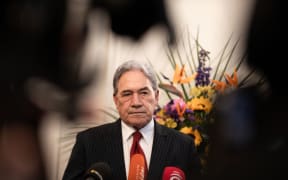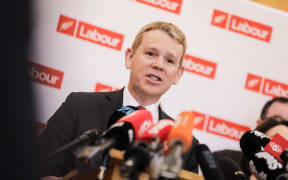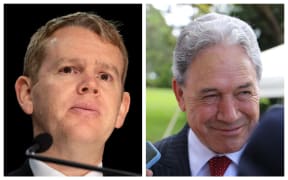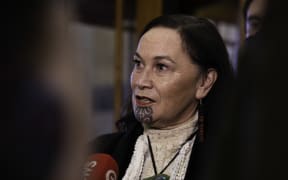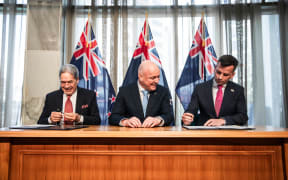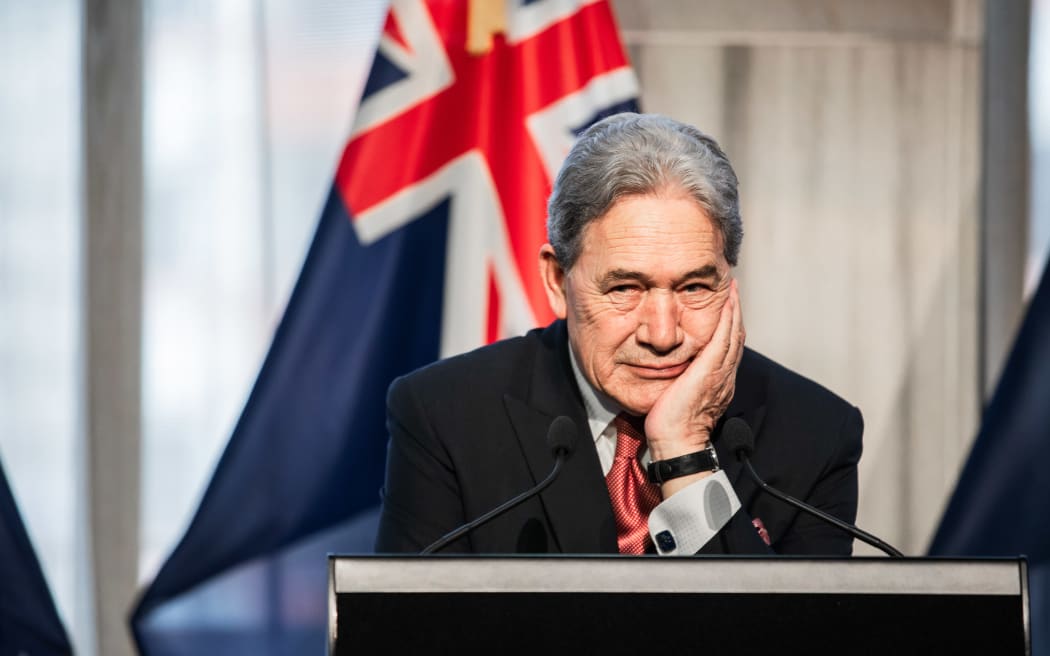
Winston Peters. Photo: RNZ / Samuel Rillstone
By Peter Wilson*
Analysis: Winston Peters' war against the media upstages the prime minister and draws a comparison with Donald Trump's populist rhetoric; there are fundamental changes for New Zealand in the government's 100-day plan; Labour announces its shadow Cabinet and the line-up offers a glimpse of its battle plans.
"I don't know what the hell he's on about." That was former broadcasting minister Willie Jackson's puzzled reaction to Deputy Prime Minister Winston Peters' claim on Monday that the media had been bribed with $55 million.
Jackson wasn't alone in that, but it quickly transpired that what Peters was on about was the Public Interest Journalism Fund set up by the previous government during the pandemic to protect the media from a catastrophic drop in advertising revenue.
Peters fired his first salvo at the swearing-in ceremony for the new government and his second when the Cabinet met for the first time.
Sitting next to Prime Minister Christopher Luxon, Peters told reporters "before you go, could you possibly tell the public what you had to sign up to to get the money, before you ask one more question, it's called transparency, thank you very much".
Luxon, who had previously said he hadn't seen Peter's initial comments, was asked what he thought of that. He smiled and ignored the question.
What the media signed up to was a public document drawn up by NZ on Air which administered the fund. It set out criteria for receiving money from it - supporting New Zealand's identity, culture and public interest requirements, including the principles of the Treaty of Waitangi. Political coverage was exempt.
Peters has not yet said precisely what the media was being bribed to do, but it has been assumed it has to do with the Treaty principles.
During his confrontations with the media, he also questioned the independence of TVNZ and RNZ, saying he hadn't seen evidence of that during the past three years.
He hasn't explained that either but it could be linked to his serial grievance that the media didn't pay enough attention to him during the election campaign.
Peters used two major events to create what he knew would be an intense controversy, events at which Luxon could have expected unfettered exposure to talk about the aims and objectives of his new government.
Why do it, and why do it now when the fund is defunct? Political commentator Bryce Edwards, speaking on Newshub's AM, voiced an opinion: Peters was adopting "an almost Trump-like populist style".
His bribery claim fed straight into a social media riddled with conspiracy theorists. Peters courted those votes, even visiting the protestors at Parliament building.
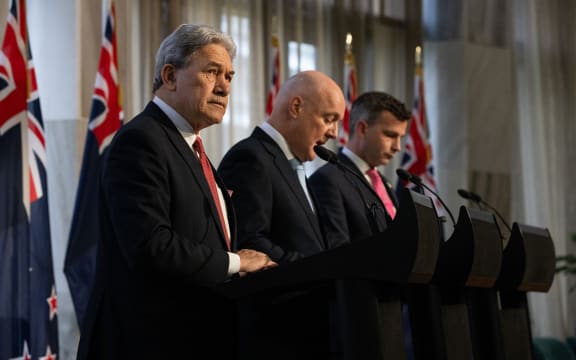
Coalition agreement signing ceremony between Christopher Luxon, David Seymour and Winston Peters. Photo: Phil Smith
Stuff's Tova O'Brien said there were various causes Peters picked up during the campaign "like crumbs to help him find his way back to Parliament" and many of them were interwoven: vaccine hesitancy, anti-trans messaging, te reo reversal and media distrust.
O'Brien said Peters' attacks were "getting wilder and more jaw-dropping every time" and he was being rewarded with what she called dopamine-fuelled endorsements on social media.
She quoted some of them from X (formerly Twitter):
- "They've all been paid to tell the former government's lies."
- "It must be embarrassing being a journalist knowing that you've been bought and traded."
- "The monies from jacinda to the MSM had strings attached and penalties to breach."
Beliefs such as those are common in the US among Trump supporters, and the former president has frequently accused mainstream media of "fake news", even describing some organisations as enemies of the state.
Media organisations here have strongly rejected the bribery allegation.
Sinead Boucher, publisher and owner of Stuff, said she didn't for a moment believe Peters genuinely thought the media had been bribed.
"He knows his comments are untrue," she said. "The time-bound New Zealand on Air fund was entirely transparent and for our company represented less than 1 percent of our own investment in the pursuit and production of journalism over that time."
Opposition leader Chris Hipkins told Morning Report the bribery allegations were "totally baseless" and Peters' comments were outrageous.
"Ultimately Christopher Luxon is in charge, he is responsible for ensuring that ministers uphold the standards of being ministers," he said.
"Winston Peters is not, and I think Christopher Luxon should do something about that… he should certainly be pulling Winston Peters into line, although at this point it seems like Winston Peters is running the show."
By the time Luxon held his first post-Cabinet press conference on Wednesday he had worked out his response, knowing he was going to be grilled.
There were three parties in the coalition and they would have different opinions and different ways of saying things, he said. He would not have used the words Peters did "but I actually also don't support the fund either".
Luxon said many New Zealanders didn't think the fund was a good idea.
"It actually leads to perceptions of bias, rightly or wrongly… that's the perception, whether that's real or not doesn't really matter, that's what the perception creates."
Luxon didn't call Peters out for making the bribery claim, but the other coalition party leader, ACT's David Seymour, came close.
He said Peters' claims were "not quite plausible".
Speaking to Newstalk ZB's Heather du Plessis Allan, Seymour said he didn't believe any notions that the PIJF was akin to bribery or that it distorted media independence, the Herald reported.
"I would make the point that $55 million over two years in a billion dollar industry, the idea that all journalists in New Zealand were corrupted by 2 percent of revenue - for me, it doesn't pass the sniff test."
He was critical of the fund in principle, though, saying it was a "very silly policy" as he didn't believe the media should be taking money from a government it would be holding to account.
There was extensive reaction to Peters during the week, and on Sean Plunket's The Platform he agreed that he was "at war" with the media.
The bribery claim wasn't the end of it. Peters also blamed the media for the long Auckland lockdown.
In an interview on The Country, he said: "If they (the media) are so concerned about the state of the economy with respect to their industry, why did they allow the second dramatic lockdown with only one case in Auckland of our biggest commercial sector in the country", the Herald reported.
"On the idea of the PIJF, Peters said: 'They came to us when I was deputy prime minister and wanted to bring this into force. We were alarmed and said to it 'you've got to be joking'. Everyone will accuse us of bribing the media and we will not support it'."
The $55m fund was announced after Peters had left Parliament.
Peters said Grant Robertson "went behind our backs and told the media Winston Peters was the roadblock trying to stop it from happening". Robertson said that was "absolute nonsense".
The Herald said it received money from the fund, but asked for a specific clause in the agreement which guaranteed absolute editorial independence.
When Luxon walked into the Beehive theatrette for his post-Cabinet press conference he didn't have Peters with him, which would probably have been a relief after the upstaging of the two previous big events.
"For the first time since he was sworn in, new Prime Minister Christopher Luxon got to have a show without Punch turning up," said Claire Trevett, the Herald's political editor.
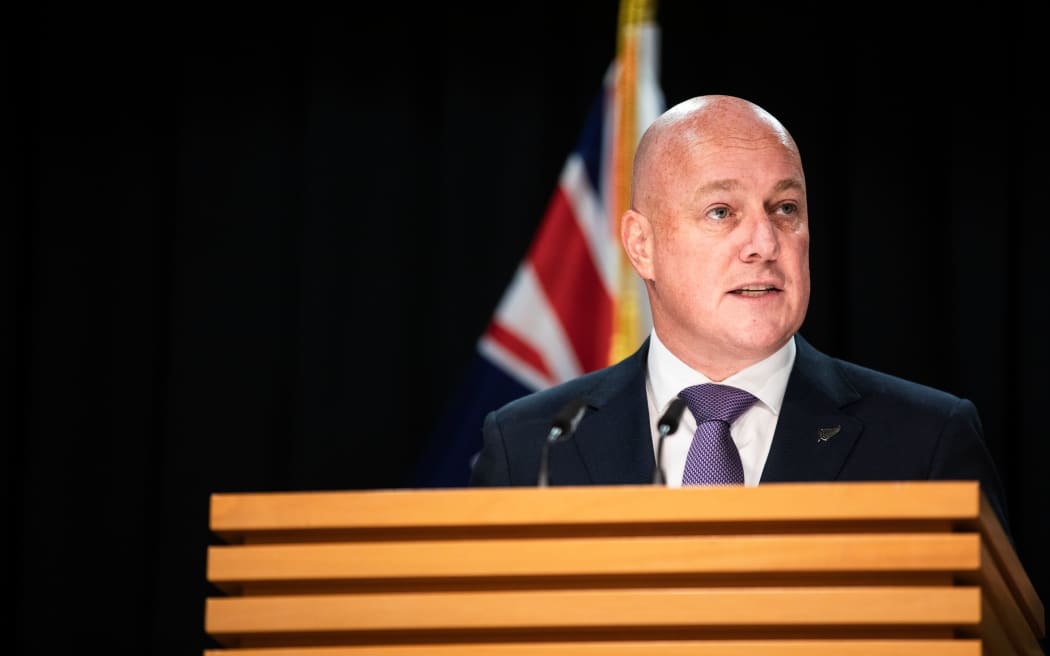
Photo: RNZ / Samuel Rillstone
Change in the air
Luxon was self-assured and in control as he outlined the government's first 100 days plan.
"New Zealanders voted for change, not just a change of government," he said as he detailed the 49 actions the government was going to take.
Change is certainly what New Zealand is getting. Out go the Fair Pay Agreement legislation, Three Waters, the latest smokefree laws, the Clean Car Discount, blanket speed limit restrictions and the Auckland Regional Fuel Tax.
In come legislation to focus the Reserve Bank on a single mandate of fighting inflation, a ban on gang patches, a ban on the use of cellphones in schools and five major targets for the health system including wait times.
All the details are in RNZ's report, 'Government confirms its 100-day plan'.
Parliament opens on Tuesday and the first Question Time - that's going to be one to watch - is on Thursday.
The government will put Parliament into urgency to pass several bills through all their stages, and it's going to have to work flat-out until it adjourns for the summer recess, most likely on 21 December.
Luxon has said he will recall it early in the New Year, possibly as soon as mid-January.
The most controversial repeal measure, the one that has drawn the most intense backlash, is the anti-smoking legislation. It would have reduced the number of stores able to sell cigarettes to around 600 nationwide, limited the strength of nicotine and made it illegal to sell tobacco to anyone born after 2009, RNZ reported.
Health advocates expressed outrage, a recently retired intensive care specialist called for Health Minister Shane Reti's resignation and Te Pāti Māori co-leader Debbie Ngarewa-Packer accused the government of "deliberate… systemic genocide".
Reports of the repeal made international headlines, and it was Luxon's first taste of a real backlash against government policy.
At his post-Cabinet press conference he defended it, saying the provisions were designed to be phased in and although the legislation had been passed they were not in effect.
He said his government was committed to lowering the smoking rate and would increase tobacco excise. It just didn't agree that the previous government was going about it the right way.
Giving an example, he said there would be one store in Northland allowed to sell cigarettes, which would make it a target for thieves and ram raids. The restrictions would also create a black market for tobacco, he claimed.
Luxon said Ngarewa-Packer's comments weren't helpful.
"Let's be clear about it, we have a difference of opinion with the previous government and what they proposed before the election and we don't think that will work," he said. "You may disagree with that, but that's our point of view."
There's no doubt now that New Zealand has a right-wing government.
After the 100-day plan had been announced the Herald ran a banner headline 'Right of Way' and said Luxon had set his coalition government the task of resetting the direction of the country.
"There are 49 actions that will have an impact on everything from what we drive, what's taught in schools and what gangs can wear, to smoking laws, hospital wait times and Māori health," it said.
Implications for Māori
There are serious implications for Māori.
Seymour didn't get his referendum on the principles of the Treaty, but he did get agreement to introduce a bill containing the principles which could lead to a referendum if it becomes law, which seems very unlikely.
The government has agreed to support it on its first reading so it can go to a select committee, but there's no guarantee of support after that. The select committee process will allow public submissions and the widespread debate that Seymour wanted on the principles.
After that it could be stopped if the committee decides it should not proceed.
No timeline has been given for the bill's introduction.
"The agreement on the Treaty Principles Bill is part of a raft of policies that will influence and shape the landscape for iwi, hapu and whanau Māori over the next three years," RNZ's Māori issues reporter Pokere Paewai said.
Forced changes in the Labour camp
The news from Labour this week was the announcement of its post-election shadow Cabinet.
Many of the roles are a continuation of the portfolios MPs held while they were ministers, though some have had to be changed due to the departure of senior figures, RNZ reported.
David Parker has been given foreign affairs after Nanaia Mahuta lost her seat. The departure of Andrew Little has meant Phil Twyford picking up immigration, while Ayesha Verrall is public service spokesperson as well as health. Grant Robertson continues to hold finance.
Stuff said Labour's top 20 MPs had about three times more ministerial experience than National, NZ First and ACT combined and there were more women than men in the top 10.
The report said Hipkins, in assigning the portfolios, had given a glimpse of his battle plans when Labour confronts the government.
"Labour will be positioning itself as better for women, children, minorities, as well as Māori, as it gets ready for Parliament to start up next week," it said.
*Peter Wilson is a life member of Parliament's press gallery, 22 years as NZPA's political editor and seven as Parliamentary bureau chief for NZ Newswire.
